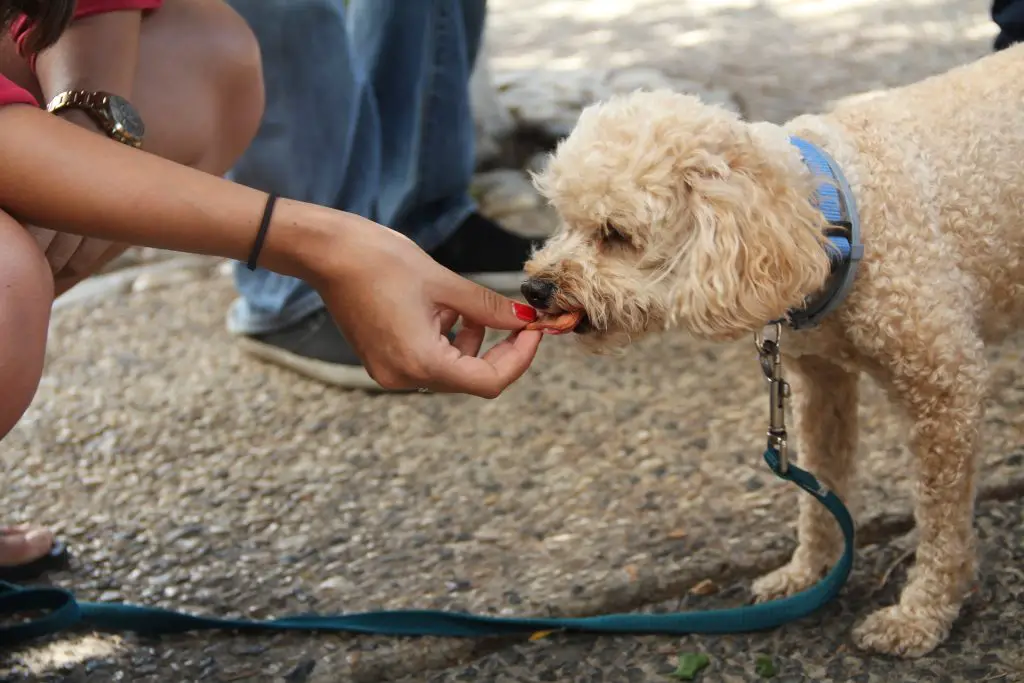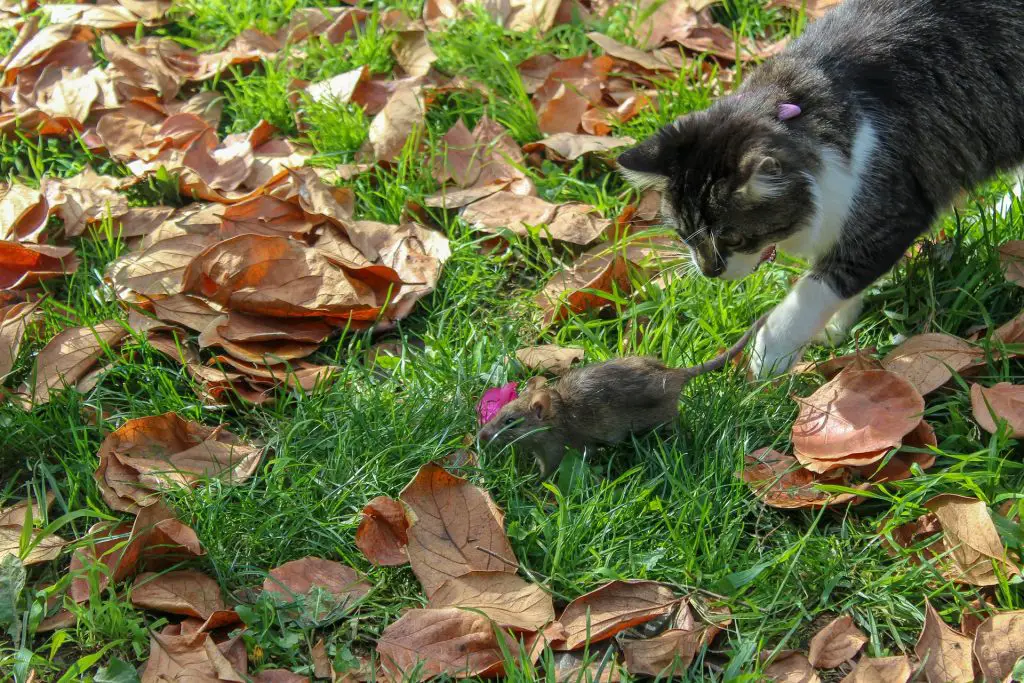Sometimes, pet lovers keep different animals as pets in the household. If you love rats and dogs, you may be considering keeping both animals as pets.
While this sounds like a great idea, do pet rats get along with dogs?
This depends mostly on the dog breed you want to keep with your rats. In the wild, rats are prey to large animals, including dogs.
Hunting dogs like golden retrievers might not get along with your pet rats. On the other hand, domestic dogs may live peacefully with your rats if you train them properly.
Whether your two pets will become buddies depends on how they relate to each other.
But you can’t know how they’ll behave in each other’s presence unless they meet. At this point, you may be wondering, Can I introduce my pet rat to my dog?
Get comfortable and keep reading as we answer this question and others about rats and dogs.
Table of Contents
Can I Introduce My Pet Rat To My Dog?
Yes, you can introduce your pet rat to your dog. However, you have to exercise patience and take the necessary precautions before taking this action.
Keep in mind that dogs are natural predators and rats are prey animals. Without being cautious, your dog can attack and harm your pet rats.
Additionally, study your dog’s temperament before introducing a rat to it. While some dogs are naturally friendly, others are aggressive.
Therefore, don’t allow your rats to live in the same environment as your dogs.
How To Introduce Your Pet Rat To Your Dog Properly
Once you’re ready to introduce your rats to your dogs, follow these simple steps:
1. Ensure Your Rat is Comfortable Being Held

Before your pet rat can feel comfortable with your dog, it must be comfortable being held.
If not, it may experience stress and begin to behave aggressively. This may result in scratching, biting, or making distressing noises.
When your rat feels safe in your hands, it will remain calm in your dog’s presence.
Consider holding your pet rat constantly to ensure it gets used to you. Hence, it won’t feel fearful in your dog’s presence.
2. Introduce the Pets in a Neutral Location
Choose a neutral location when looking for where to introduce both pets. In other words, consider a place that is not your rat’s or dog’s habitat.
This will help to prevent territoriality and the aggressive behaviors that come with it.
Generally, most animals feel threatened when others invade their territory. As a result, they may feel stressed and try to defend themselves by acting aggressively.
When you bring your rat and dog to a place where neither of them lives, they’ll likely behave calmly.
It’s best to choose a quiet and safe area with fewer distractions for the introduction.
3. Allow the Rat and Dog to Smell Each Other
When it’s time to introduce your rat and dog, allow them to smell each other. Doing this will allow both animals to become familiar with each other’s scent in a controlled area.
But ensure your rat is in its cage before bringing your dog into the environment. Despite being small animals, rats can become aggressive toward dogs if they feel threatened.
Preferably, get a rat cage with metal bars to keep your pet rat secure. In this case, you can rest assured that nothing can possibly go wrong.
If the pets behave calmly towards each other, bring them slowly and carefully together.
However, don’t release the pet rat from its cage yet, even if your dog seems to cooperate.
Even the most friendly dog can suddenly change and become violent. For the first few days of introducing both pets, keep the interactions short and interesting.
4. Be Observant Throughout the Process
To keep your pet rat and dog safe during the introduction process, be observant. Pay close attention to the pets’ body language, behaviors, and interactions with each other.
Your dog may exhibit signs of aggression, including barking, growling, or snapping. On the other hand, your rat can feel stressed, which may result in excessive grooming.
When you monitor the pets closely, it will be easy to identify any potential problems and avoid them the next time. Moreover, you’ll be able to keep the animals safe in the face of danger.
Make sure you give both pets equal attention while introducing them to each other.
Additionally, stay calm, as it can increase the chances of getting a positive response from the animals.
5. Reward Your Dog for Good Interaction

Whenever your pet dog relates to your rat calmly, reward it positively. Give the pet treats or rub its fur as a sign of affection for good behavior.
This will allow your dog to associate calmness in the rat’s presence with receiving treats. Moreover, the introduction process will be less stressful for you and the two animals.
Within a short time, the pet rat and dog will feel comfortable in each other’s presence.
6. Separate the Pets If You Notice Signs of Aggression
Once you notice signs of aggression in either of the pets, separate them immediately. This will ensure that you and the animals are safe.
Signs of aggression in dogs include growling, barking, a hard stare, and lunging. Some signs of aggressive behaviors in rats include hissing, tail rattling, puffed fur, and teeth chattering.
After separating the rat and dog, choose another day before introducing them to each other. There’s a chance they’ll behave calmly the next time they meet.
7. Be Patient and Consistent
Understand that it may take some time for your pet rat to feel relaxed in your dog’s presence.
Hence, you need to exercise patience and be consistent until you notice a positive response. If possible, create a daily schedule for the times you’ll be introducing both pets to each other.
When they meet regularly, they’ll soon become comfortable in each other’s presence.
But if you’re not consistent with the process, it may be stressful and take a longer time.
Can Pet Rats and Dogs Play Together?
Yes, pet rats and dogs can play together. However, this depends on the dogs’ breed and their level of training.
While some dog breeds have a peaceful nature, others have a strong innate drive to hunt and kill.
When it comes to training, some dogs act on commands quickly, while others take some time.
Dogs that are well-trained and have a calm temperament can play with your pet rats.
Still, you have to monitor the animals throughout the time they play together. Even when your dogs behave friendly, keep in mind that rats are prey to them.
Therefore, it is important to do everything possible to keep your little furry friends safe.
Are Dogs Afraid of Rats?
Typically, dogs are not afraid of rats because they’re among the small animals’ predators.
However, certain factors can make a dog scared of rats. These factors include the dog’s personality and experience.
In terms of personality, some dogs are quiet and extremely cautious, while others are fearless.
If a dog has had a negative experience with rats when it was little, it may feel fearful in their presence.
In a case where these major factors are not in play, dogs should not be afraid of rats.
Do Dogs Kill Rats?
Yes, dogs do kill rats, especially the hunting breed. In the wild, dogs hunt down and kill small animals, including rats.
They are fast and have a good sense of smell, which makes catching these rodents easy. Dogs can kill rats in many ways, depending on their breed, size, and hunting skills.
While some dogs shake rats aggressively to death, others use their jaws to crush them.
If you have dog and rat pets, you can train your dog not to harm your little pet. One of the most important ways to achieve this is to introduce the rat to your dog.
What To Do If You Own a Pet Rat and a Dog
If you own both a pet rat and a dog, follow these tips to keep your rat safe.
- Introduce the two animals slowly, and keep the interaction as short as possible.
- Ensure they live in separate cages and environments. Keeping both pets in the same place can cause stress for your rat.
- Even if your dog acts calm around your rat, always keep an eye on them when playing.
- Whenever your dog behaves calmly around your rat, reward him with treats.
- Always keep your rat’s cage locked and out of reach of your dog.
- Ensure your rat’s cage has places where it can hide when feeling fearful.
- Train your dog to listen to simple commands such as “stop,” “leave him,” and more.
- Always keep both pets comfortable, as uncomfortable animals can act aggressively.
- If your pet rat or dog continues to behave aggressively, consult your vet for professional advice.
What Other Pets Do Pet Rats Get Along With?

Pet rats can get along with other pets, considering their social nature. Here are the other pets they can live with:
- Rabbits
- Guinea pigs
- Gerbils
- Birds
- Cats
Recap
Under normal circumstances, pet rats do not get along with dogs. But there can be exceptions when you introduce both animals to each other.
To make this process easy, ensure your pet rat is comfortable being held. Also, introduce the pets in a neutral area, and always reward your dog with treats for good behavior.
Additionally, allow the rat and dog to smell each other and pay close attention to them.
Further, be patient, as it may take some time before both animals get used to each other.
Study the personalities and breeds of your pets before allowing them to live together. Once you notice repeated signs of aggression or stress in your rat or dog, consult your vet.
If you’re considering keeping guinea pigs and rats as pets, check out this article – Can Guinea Pigs and Rats Live Together?
Source:
